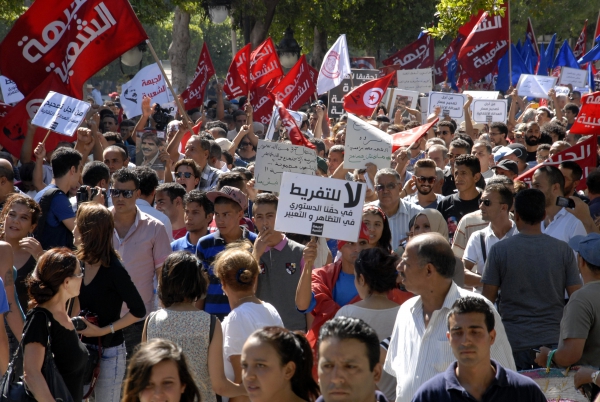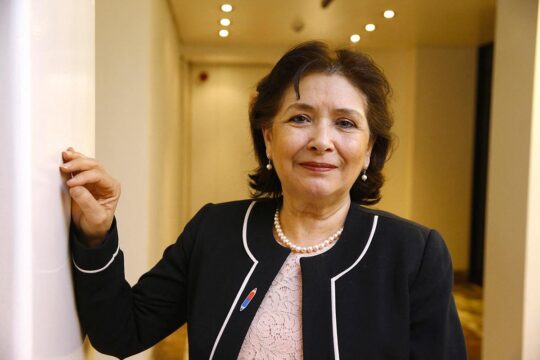A special feature of transitional justice in Tunisia is that it includes corruption and abuses of economic rights, which are included in the mandate of the country’s Truth and Dignity Commission. This aspect of the law reflects a demand from the population expressed in slogans during the Revolution and from civil society throughout national consultations on transitional justice in 2012. The Tunisian population appears still to adhere to this demand. This is reflected in a survey on perceptions of transitional justice published in 2015, according to which 97% of Tunisians think the fight against corruption should be a priority in the institutional reforms envisaged under the transitional justice process.
What happened to our assets?
On July 14, however, President Beji Caied Essebsi’s bill on “Economic and Financial Reconciliation” sought to take corruption out of transitional justice by removing the mandate of the Truth Commission to arbitrate on economic crimes. As the controversy around the President’s initiative has waned in recent weeks, the International Center for Transitional Justice (ICTJ), the UN Development Progamme (PNUD) and the office of the UN High Commissioner for Human Rights have taken an advantage to organize a recent workshop in Tunis with civil society organizations on handling corruption cases within the context of transitional justice.
In fact, the President’s bill comes as crimes of corruption committed under Ben Ali (ex-president now exiled in Saudi Arabia), mainly by him and people close to him, have not been dealt with since the January 2011 revolution in a way that reflects their seriousness.
One of the reasons for this failure is the multitude of players who are supposed to decide these cases.
Too many, too slow, not transparent
First there was the “Commission of Inquiry on embezzlement and corruption”. This body led by the late Abdelfettah Amor was set up just after January 14 and finished its work in November 2011. It presented a detailed report covering 5,000 cases and submitted 320 others to the judicial and financial unit. Many observers of the process see the work of this commission as the most serious and in-depth so far.
At the same time a commission was set up under a March 2011 law on confiscation of assets obtained unlawfully by the former President, 110 members of his family and “any other person found to have obtained fixed or liquid assets through relations with these people”. On June 8, 2015, the administrative Tribunal handed down a surprise decision: to cancel this law and judicial procedures against Ben Ali and his close circle!
In spring 2011 the “national committee for recovery of ill-gotten assets placed abroad” was set up in an almost informal way at the Central Bank of Tunisia. Then in November 2011 the “national anti-corruption commission” was set up, then the “judicial and financial unit” (August 2011), the “high council on anti-corruption and recovery of State assets” (August 2012) and the Truth and Dignity Commission (June 2014). As for the President’s bill, it proposes to set up a reconciliation commission operating under the presidency. It would cancel all the provisions on corruption and misuse of public assets contained in the transitional justice law and make information obtained by the commission confidential.
According to UNDP experts, those charged with handling corruption cases have not coordinated with each other, and have not produced concrete or satisfactory results.
“We do not have any information right now on the process for recovering Ben Ali’s assets, nor on presidential family money put in foreign banks, nor on the state of progress on the Amor commission cases,” says Kamel Gharbi, head of the Tunisian Network for Transitional Justice.
No judicial reform
“Instead of setting up a plethora of bodies, what was needed was to strengthen the Truth Commission,” says one lawyer. “Its role is not only arbitration but also to investigate the way corruption worked under the old regime and propose measures to make sure it cannot happen again.”
“How can these cases be handled in a transparent way when there has been no reform of the judicial system and there are still lobbies close to the ex-president intervening to stop corruption cases moving forward?” asks transitional justice researcher Ahmed Alaoui. “Is there political will to get rid of this scourge?”
Tunisian civil society associations seem aware of the role they will be required to play when the Truth and Dignity Commission finishes its work. The implementation of its recommendations will depend at least in part on their vigilance.
ICTJ anti-corruption expert Ruben Carranza issued this warning to Tunisian associations: “Fighting the corruption mechanisms of authoritarian regimes takes a long time. In Argentina it has been ongoing for 40 years and in the Philippines for more than 20 years. Success depends on the balance of political forces at the time, but also on the expertise of those defending cases and on cooperation between civil society groups here and elsewhere, especially Switzerland where many ill-gotten gains are sitting in banks. In many countries that have gone through transitions, it has been necessary following the work of truth commissions to set up government agencies on recovering dictators’ assets.”
On December 9, International Anti-corruption Day, UNDP is organizing a conference in Tunis to discuss progress and perspectives for the fight against corruption in Tunisia. The panel, which includes the Truth and Dignity Commission, focuses on the handling of corruption as part of transitional justice and the Commission’s strategy on this. Civil society has a chance to get more involved in the debate on corruption which, thanks to impunity, has actually risen 25% in Tunisia since the revolution, according to Transparency International.






